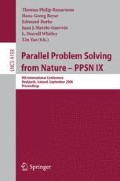Abstract
Understanding how neutrality works in EC systems has drawn increasing attention. However, some researchers have found neutrality to be beneficial for the evolutionary process while others have found it either useless or worse. We believe there are various reasons for these contradictory results: (a) many studies have based their conclusions using crossover and mutation as main operators rather than using only mutation (Kimura’s studies were done analysing only mutations) and, (b) studies often consider problems and representation with larger complexity. The aim of this paper is to analyse how neutral mutations tend to behave in GP and establish how important they are. For this purpose we introduce an approach which has two advantages: (a) it allows us to specify neutrality and, (b) this makes possible to understand how neutrality affects the evolutionary search process.
Access this chapter
Tax calculation will be finalised at checkout
Purchases are for personal use only
Preview
Unable to display preview. Download preview PDF.
References
Angeline, P.: Genetic Programming and Emergent Intelligence. In: Kinnear Jr., K.E. (ed.) Advances in Genetic Programming, pp. 75–98. MIT Press, Cambridge (1994)
Banzhaf, W.: Genotype-phenotype-mapping and neutral variation – A case study in genetic programming. In: Davidor, Y., Männer, R., Schwefel, H.-P. (eds.) PPSN 1994. LNCS, vol. 866, pp. 322–332. Springer, Heidelberg (1994)
Chow, R.: Evolving genotype to phenotype mappings with a multiple-chromosome genetic algorithm. In: Deb, K., et al. (eds.) GECCO 2004. Proceedings of the 2004 Conference on Genetic and Evolutionary Computation, Seattle, WA, USA, June 26-30, 2004, vol. 1, pp. 1006–1017. Springer, Heidelberg (2004)
Collins, M.: Finding needles in haystacks is harder with neutrality. In: Beyer, H.-G., et al. (eds.) GECCO 2005. Proceedings of the 2005 conference on Genetic and evolutionary computation, Washington, June 25-29, 2005, vol. 2, pp. 1613–1618. ACM Press, New York (2005)
Harvey, I., Thompson, A.: Through the labyrinth evolution finds a way: A silicon ridge. In: Higuchi, T., Iwata, M., Weixin, L. (eds.) ICES 1996. LNCS, vol. 1259, pp. 406–422. Springer, Heidelberg (1997)
Jefferson, D., Collins, R., Cooper, C., Dyer, M., Flowers, M., Korf, R., Taylor, C., Wang, A.: Evolution as a Theme in Artificial Life: The Genesys/Tracker System. In: Langton, C.G., et al. (eds.) Artificial Life II. Santa Fe Institute Studies in the Sciences of Complexity, vol. X, pp. 549–578. Addison-Wesley, Reading (1992)
Keller, R.E., Banzhaf, W.: Genetic programming using genotype-phenotype mapping from linear genomes into linear phenotypes. In: Koza, J.R., et al. (eds.) Genetic Programming 1996. Proceedings of the First Annual Conference, Stanford University, CA, USA, July 28-31, 1996, pp. 116–122. MIT Press, Cambridge (1996)
Kimura, M.: Evolutionary rate at the molecular level. Nature 217, 624–626 (1968)
Langdon, W., Poli, R.: Foundations of Genetic Programming. Springer, Heidelberg (2002)
Luke, S.: Code Growth is Not Caused by Introns. In: Whitley, D. (ed.) Late Breaking Papers at the 2000 Genetic and Evolutionary Computation Conference, Las Vegas, Nevada, USA, July 8, 2000, pp. 228–235 (2000)
Miller, J.F., Thomson, P.: Cartesian genetic programming. In: Poli, R., Banzhaf, W., Langdon, W.B., Miller, J., Nordin, P., Fogarty, T.C. (eds.) EuroGP 2000. LNCS, vol. 1802, pp. 121–132. Springer, Heidelberg (2000)
Nordin, P., Banzhaf, W.: Complexity Compression and Evolution. In: Eshelman, L. (ed.) Genetic Algorithms. Proceedings of the Sixth International Conference (ICGA 1995), Pittsburgh, pp. 310–317. Morgan Kaufmann, San Francisco (1995)
Nordin, P., Banzhaf, W., Francone, F.: Introns in Nature and in Simulated Structure evolution. In: Lundh, D., et al. (eds.) Bio-Computation and Emergent Computation, Skovde, Sweden, September 1-2, 1997, World Scientific Publishing, Singapore (1997)
Nordin, P., Francone, F., Banzhaf, W.: Explicitly Defined Introns and Destructive Crossover in Genetic Programming. In: Rosca, J.P. (ed.) Proceedings of the Workshop on Genetic Programming: From Theory to Real-World Applications, Tahoe City, California, USA, July 9, 1995, pp. 6–22 (1995)
Shipman, R., Schackleton, M., Harvey, I.: The use of neutral genotype-phenotype mappings for improved evolutionary search. BT. Technology Journal 18(4), 103–111 (2000)
Shipman, R., Schakleton, M., Ebner, M., Watson, R.: Neutral search spaces for artificial evolution: A lesson from life. In: Bedau, M., Rasmussen, S., McCaskill, J., Packard, N. (eds.) Artificial Life: Proceedings of the Seventh International Conference on Artificial Evolution, pp. 162–169. MIT Press, Cambridge (2000)
Smith, T., Husbands, P., O’Shea, M.: Neutral networks and evolvability with complex genotype-phenotype mapping. In: Kelemen, J., Sosík, P. (eds.) ECAL 2001. LNCS (LNAI), vol. 2159, pp. 272–282. Springer, Heidelberg (2001)
Smith, T., Husbands, P., O’Shea, M.: Neutral networks in an evolutionary robotics search space. In: Congress on Evolutionary Computation: CEC 2001, pp. 136–145. IEEE Press, Los Alamitos (2001)
Yu, T., Miller, J.: Neutrality and the evolvability of boolean function landscape. In: Fourth European Conference on GP, pp. 204–211. Springer, Heidelberg (2001)
Yu, T., Miller, J.F.: Needles in haystacks are not hard to find with neutrality. In: Foster, J.A., Lutton, E., Miller, J., Ryan, C., Tettamanzi, A.G.B. (eds.) EuroGP 2002. LNCS, vol. 2278, pp. 13–25. Springer, Heidelberg (2002)
Yu, T., Miller, J.F.: The role of neutral and adaptive mutation in an evolutionary search on the onemax problem. In: Cantú-Paz, E. (ed.) Late Breaking Papers at the Genetic and Evolutionary Computation Conference (GECCO 2002), New York, pp. 512–519. AAAI, Menlo Park (2002)
Author information
Authors and Affiliations
Editor information
Editors and Affiliations
Rights and permissions
Copyright information
© 2006 Springer-Verlag Berlin Heidelberg
About this paper
Cite this paper
Galván-López, E., Rodríguez-Vázquez, K. (2006). The Importance of Neutral Mutations in GP. In: Runarsson, T.P., Beyer, HG., Burke, E., Merelo-Guervós, J.J., Whitley, L.D., Yao, X. (eds) Parallel Problem Solving from Nature - PPSN IX. PPSN 2006. Lecture Notes in Computer Science, vol 4193. Springer, Berlin, Heidelberg. https://doi.org/10.1007/11844297_88
Download citation
DOI: https://doi.org/10.1007/11844297_88
Publisher Name: Springer, Berlin, Heidelberg
Print ISBN: 978-3-540-38990-3
Online ISBN: 978-3-540-38991-0
eBook Packages: Computer ScienceComputer Science (R0)

